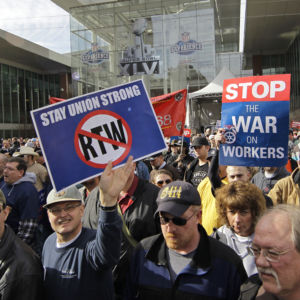A Kentucky circuit court decision was applauded by a leading union choice advocate Tuesday for upholding a law that makes right-to-work a statewide policy.
Kentucky Republican Gov. Matt Bevin signed right-to-work into law early last year in a huge defeat for unions in the state. The policy outlaws mandatory union dues or fees as a condition of employment. Teamsters Local 89 responded by filing a lawsuit against the governor – arguing the law would illegally take union property without just compensation.
Franklin Circuit Court Judge Thomas D. Wingate dismissed the lawsuit on the grounds that the union failed to justify its position. The National Right to Work Foundation (NRTW), a staunch advocate for optional union payments, applauded the decision as a win for workers.
“We welcome today’s ruling by the Franklin County Circuit Court,” NRTW President Mark Mix said in a statement provided to InsideSources. “Right to Work laws have long been upheld by appellate courts, including the U.S. Supreme Court, so it comes as no surprise that union bosses’ arguments against Kentucky’s Right to Work law were rejected in this case.”
The NRTW was able to successfully intervene in the case last year on behalf of three workers in the state. Those workers supported the recently passed right-to-work law and were hoping to see it upheld. They were able to become a party in the case by filing a motion to intervene and by showing they have an interest in the subject matter.
Mix adds that right-to-work simply ensures that union membership and financial support are strictly voluntary. Kentucky Republicans have tried numerous times in recent years to pass the policy into law. A recent election gave supporters enough votes in the legislature to finally get it through.
“Rather than wasting tax dollars and workers’ dues money continuing this frivolous legal attack on Right to Work, Kentucky union bosses ought to be working to ensure that the representation they claim to provide is actually a service Kentucky employees will voluntarily pay for,” Mix said.
Teamsters Local 89 argued the law illegally takes its property by depriving it the ability to require payment. Labor unions are required to represent every worker once they organize a workplace as an exclusive representative – whether they make payments or not. They argue that optional dues encourage workers to free-ride on the benefits they provide.
“The Court holds that Plaintiffs do not hold a vested property interest in union service or future union security contracts,” the decision, which was obtained by InsideSources, stated. “No genuine issue of material fact exists for any of these issues.”
Kentucky Democrats, labor unions, and other opponents warned the measure is just an underhanded way to hurt unions and workers. They argued that strong unions are needed to properly protect workers against abusive employers. Those in support countered that it’s actually about giving workers the freedom to choose.
Teamsters Local 89 did not respond to a request for comment by InsideSources.

